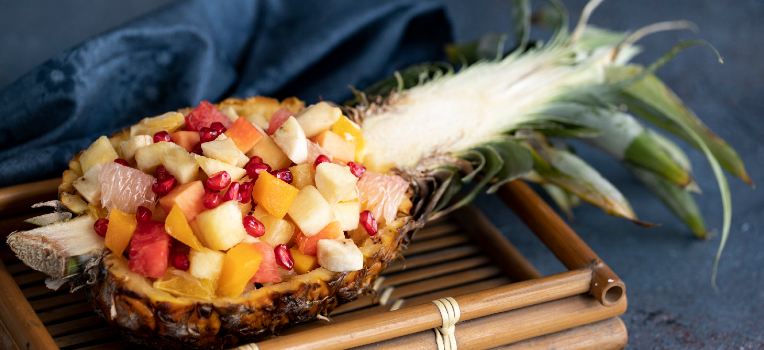Reviewed by the Progyny Clinical Team — December 2025.
Pomegranate: A fertility superfood?
You may have heard that consuming pomegranate juice or eating pomegranate seeds could boost your chances of pregnancy. But is there scientific evidence to back this up?
Why pomegranate may support fertility
- Antioxidants and sperm health: Pomegranate is rich in antioxidants, particularly polyphenols, which can help protect sperm from oxidative stress. This is important because oxidative stress can damage sperm DNA and impair movement, both of which can reduce fertility.
- Scientific backing: Some research has shown that dietary antioxidants, like those found in pomegranate, can improve sperm quality — including its movement, volume, and shape. However, major trials are still needed to clarify the exact role of antioxidants.
- Impact on the uterus: A few studies suggest pomegranate may also have a positive effect on the uterine environment, potentially supporting implantation, though more research is needed to confirm these effects.
Precautions
While pomegranate is generally safe for most people, it may interact with certain medications, particularly statins (for high cholesterol) and blood thinners. If you’re on either of these medications, consult your healthcare provider before increasing your pomegranate intake.
Pineapple: Can it boost fertility?
Pineapple, particularly the core, is often touted as a fertility-boosting food. But how much truth is there behind this claim?
Why pineapple may aid fertility
- Bromelain and inflammation: Pineapple contains an enzyme called bromelain, which has anti-inflammatory and anti-coagulation (blood-thinning) properties. Bromelain may support the immune system and help reduce inflammation, a key factor in fertility issues such as endometriosis.
- Supporting uterine health: One theory is that bromelain may improve blood flow to the uterus, which could help with the uterine lining — an important factor for embryo implantation. Some studies suggest that bromelain’s blood-thinning effects could support a healthier uterine environment following ovulation or embryo transfer. However, clinical evidence on this specific benefit is still limited.
Precautions
Bromelain’s blood-thinning effects can interfere with medications like aspirin or warfarin. If you’re taking any anticoagulant medications, it’s important to consult with your provider before adding pineapple or bromelain supplements to your diet.
Keep in mind
While pomegranate and pineapple are rich in nutrients and antioxidants that can support reproductive health, the clinical evidence linking these fruits directly to improved fertility is limited. Most studies have been small, and larger clinical trials are needed to fully confirm the effects.
Incorporating these fruits into your diet is unlikely to harm your fertility, but they should be seen as part of an overall healthy lifestyle rather than a miracle solution. For the best results, consider discussing your fertility journey with a nutritionist or OB-GYN who can guide you in choosing the most effective dietary strategies.
If you have questions or concerns, Progyny is here for you. Please contact your Progyny Care Advocate for support.
Disclaimer: The information provided by Progyny is for educational purposes only and is not medical advice. Always consult a qualified healthcare provider for medical guidance.
